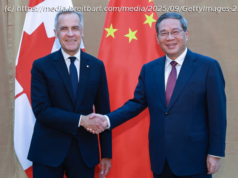They say it will be hard to push forward denuclearisation without Beijing
Even though Beijing did not take part in the meeting between US President Donald Trump and North Korean leader Kim Jong-un on Tuesday, China watchers say it had much to gain from it.
When Trump and Kim wrapped up their history-making summit at a luxury hotel in Singapore by signing what many observers say is “no more than a symbolic” agreement, it reinforced the role of Beijing – Pyongyang’s closest ally and largest trading partner – according to analysts.
Speaking to the media after the summit, Trump said he would call Chinese President Xi Jinping to discuss the talks. “China is a great country and [it has a] great leader who is a friend of mine. I believe he is happy we made this progress. I heard from him. I will call him shortly – maybe before I land,” Trump said.
Although Beijing was not officially involved in the landmark talks, China’s influence over the reclusive North Korean regime had still been felt, analysts said, and the “symbolic” nature of the agreement shed light on its role in the process.
“This has shown that the disputes between Washington and Pyongyang remain large and cannot be resolved in a single summit,” said Cheng Xiaohe, a Korean affairs expert at Renmin University of China.
“Without support from China, it’s really difficult for Washington and Pyongyang to press ahead on denuclearisation and the peace process,” Cheng said. “China – and also regional players including Japan and Russia – could play a part in the efforts that follow.”
Developments in the Korean peninsula negotiations were in line with what Beijing had expected, according to analysts, with both sides pledging in the agreement to support a peaceful resolution to the seven decades of hostility between the two countries and a de-escalation of nuclear tensions.
“China has not made any losses here,” said Deng Yuwen, a political analyst based in Beijing.
“It is also a goal of China’s to seek denuclearisation on the Korean peninsula, and without a clear timetable or any specific measures to dismantle nuclear weapons in North Korea, Washington will need Beijing if it wants to apply more pressure to Pyongyang.”
Trump has also expressed the hope that both China and South Korea will play a major part in developing North Korea’s economy, something Kim is seeking.
The US president meanwhile told reporters after the summit that he would suspend war games with South Korea, which he described as “expensive” and “provocative”.
Analysts said this was a major concession to North Korea, especially given that Kim made no concrete pledge on the process of denuclearisation but just reaffirmed a vaguely worded promise he has given to South Korea before.
“I have always opposed ‘freeze for freeze’, because it equates the US-ROK exercises (stabilising, legal) with North Korea testing (destabilising, illegal). Now [Trump] has criticised the exercises as provocative and given them up for… nothing?” Abraham M. Denmark, director of the Asia Programme at the Woodrow Wilson International Centre for Scholars, tweeted.
It was also seen by some analysts as a big victory for China, since Beijing had sought a “dual suspension” – or “freeze for freeze” – where the US and South Korea froze military exercises in exchange for the North suspending nuclear weapons testing.
Despite a year-long stand-off over Seoul’s deployment of a US anti-missile shield, China and the South found themselves on the same side last year as tensions rose on the Korean peninsula after Trump threatened the North with “fire and fury” following missile tests that Pyongyang said could reach the mainland of the United States.
Seoul also sees Beijing playing a bigger part in the negotiations.
In an opinion piece in Chinese media, Chung In-moon, a special adviser to South Korean President Moon Jae-in on foreign affairs and national security, said Beijing’s role in the Korean peninsula peace process “will be larger in the future”.
Some observers had speculated that Beijing could be left out after Seoul suggested Moon may join the Singapore summit and declare the end to the Korean war without China.
But Chung said China would not be left out. “The proposal for a declaration ending the war was just an attempt to speed up the denuclearisation process by North Korea,” Chung said.
“So far, the Korean peninsula issues are developing mostly in the direction China is hoping for – and after the Kim-Trump summit in Singapore, China’s role will definitely be bigger.”
But analysts warned there were still big challenges ahead, especially since the two sides failed to reach any specific agreement on dismantling North Korea’s nuclear weapons – a threat on China’s doorstep.
“This was an opportunity to make a breakthrough and if we missed it, how can we be sure the tensions on the Korean peninsula won’t return?” said Zhu Feng, an international relations specialist at Nanjing University.
Meanwhile, there is no sign that the American alliance with South Korea and Japan is diminishing, even though Trump has said he would consider withdrawing US troops from the South.
Beijing could also be watching to see whether Pyongyang will draw closer to Washington after the talks. One lesson there is Vietnam, a former Communist ally that has emerged as one of the strongest opponents of China’s assertiveness in the South China Sea.
“I think China may be concerned about losing their leverage over North Korea and fears that North Korea and the US may enter into an anti-Chinese alignment,” said Charles Armstrong, a historian on Korean affairs at Columbia University. “This may seem far-fetched but it has happened with Vietnam.”
Additional reporting by Nectar Gan and Shi Jiangtao
Home
United States
USA — China China wasn’t at the table but Trump-Kim talks reinforced its role, analysts...






